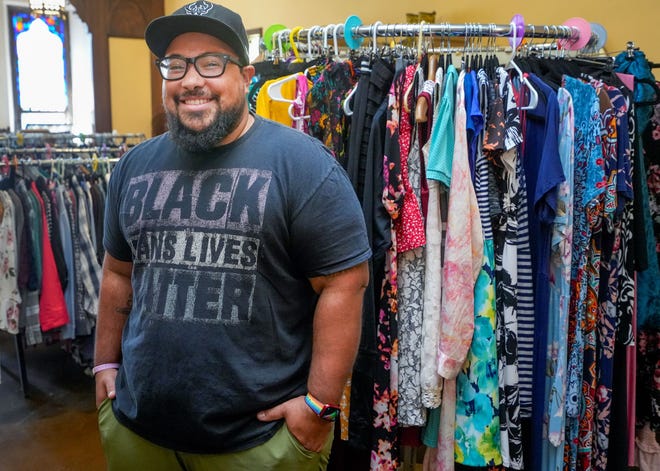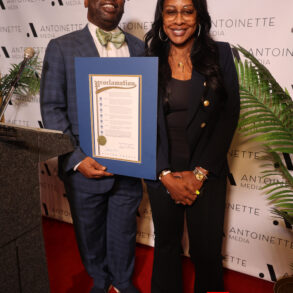
Cameron Overton first met Jamie Robarge while he was marching in the Milwaukee Pride Parade this past June.
“We were just marching down the street, and a person came running at me from the crowd, and was like, ‘Are you Cameron?’ ” Overton said, laughing. “We quickly exchanged information, and then she disappeared back into the crowd.”
Robarge, a Milwaukee photographer, wanted to meet Overton because she was in the process of planning a gender-affirming clothing swap. Overton, a transgender pastor of LGBTQ-inclusive church Zao Milwaukee, had volunteered at one at Bounce Milwaukee in 2022.
Gender-affirming clothing swaps are events which offer donated clothing to people for free. Although anyone can attend, their target audience is people who are transgender or gender-nonconforming who are looking to build a wardrobe of clothing that matches their identity.
“After Bounce’s clothing swap, some of us were thinking of organizing another smaller swap for Pride,” Overton said. “At the Pride parade, Jamie told me she wanted to help out, and then she took the lead on making it happen at her studio. I was excited to partner with anybody who was wanting to do something for my community.”
Why gender-affirming clothing swaps are important
Overton said his clothes and hairstyle were an important part of how he presented himself to the world when he started his transition.
“I remember the day I snipped off my long hair,” Overton said. “It was an emotional experience because it symbolized something.”
Still, Overton’s gender euphoria — a description of feeling “right” in your gender — upon transforming his outward presentation to match his gender had been difficult to accomplish.
“At the beginning of my transition, I didn’t really feel comfortable going into the men’s section of stores and picking out clothes to try on,” Overton said. “I didn’t know my sizes or styles, and I didn’t know where to ask. We need safe places to figure out what styles are right for us.”
Bex Streit — the transgender and gender non-conforming program coordinator for the Milwaukee LGBT community center — agrees.
“A lot of times, for people who are gender non-conforming or newly out as trans, going into a traditional clothing store setting can be uncomfortable,” Streit said. “People can be wondering, ‘Why is this person looking in this section?’ And going into dressing rooms can be nerve-wracking.”
Streit also pointed out the expense involved in assembling a whole new wardrobe, especially since transgender people’s sizes and styles often evolve as they go through the transition process.
‘Whatever you’re trying on or trying out, we’re going to support you’

The expense involved in changing a wardrobe as well as the need for a safe space in which to figure out style and fit were both things Robarge heard from her trans friends over the past few years and are the reasons she decided to host her clothing swap in June.
“Several of my trans friends have shared with me those pinch points when shopping, like going to stores and feeling weird looks in the men’s or women’s section, or not feeling comfortable asking people to help them figure out a size,” Robarge said. “One of my friends had top surgery and he told me he had no idea what button-down shirt size would fit and that he couldn’t spend a lot of money for something that wouldn’t fit.
“I’ve just been subconsciously thinking, ‘we have to do something.’ “
Along with offering a space to try on free clothes, at Robarge’s clothing swap on June 24, stylists from Nice Hair MKE gave free haircuts. Another stylist gave makeup and hair styling lessons. Robarge estimates between 50 and 60 people came to her two-day event, and many of them thanked her not just for the free clothes, but also for creating a safe place.
“Community outreach has always been important to me, and now that I have steady jobs coming in, I have a platform where I can use my voice to stand up for what I believe is right,” she said.
Becky Cooper’s reasons for hosting two gender-affirming clothing swaps at Bounce Milwaukee (which she and her husband owned until recently) included her experience raising her transgender son, who is now an adult.
“My oldest son is trans, so we’ve always been aware of and involved with activism,” Cooper said. “When I saw a similar clothing swap happening in Eau Claire, I asked the organizer if I could steal the idea and ramp it up on steroids. They said, ‘Please do.’ “
Cooper’s first clothing swap in May 2022 was more successful than she had hoped, with more than 400 attendees and more clothing donations than she could put out on the tables.
“It ended up being a really positive, affirming event for the whole community, not even just for gender,” Cooper said. “I think it’s really difficult for young trans people to figure out their style or persona when they have limited or no income and often no family support.
“Then to come into a community that says, ‘Whatever you’re trying on or trying out, we’re going to support you in discovering your identity.’ Knowing that community exists is really important, especially in the political climate now.”
Affirming communities and rainbow shields
That political climate — which includes violence against trans people and hundreds of bills and school district policies limiting gender-affirming care — became obvious to Cooper when she began getting Facebook messages and phone calls before her second clothing swap, held in August.
“People were telling us how disgusting we are, how we’re grooming children, and leaving negative business reviews,” Cooper said.
When Overton found out there were going to be protestors at Cooper’s swap, he and supporters organized to shield attendees with rainbow signs, balloons and boards — something that supporters had done at his church during a Family Pride event in June.
“We had heard that people were going to show up to protest at the clothing swap so we had 100 people with a rainbow wall, and then the protestors didn’t show up; it was beautifully interrupted,” Overton said. “It was like at our event where 25 people came to protest, but we had 200 people shield the kids with rainbows.
“It’s so cool to watch our community come together and have each other’s backs.”
Overton said the presence of an affirming community is necessary in a time when people are facing anti-trans backlash, and it’s why a church like Zao “has to exist — to give people hope that organizing can happen.”
Overton explained that Zao means “to be among the living” in Greek; the name reflects the church’s mission to focus on the messages of Jesus that were meant to bring new life, and to emphasize an understanding that people cannot be fully alive unless they are allowed to be themselves. At Zao, Jesus is portrayed as radically inclusive, lifting up the needs of marginalized people and those who are often cast out of society.
Gender-affirming clothing boutiques

Zao MKE shows its support of the transgender community through a more permanent gender-affirming clothing venue.
After the first Bounce clothing swap and another swap held in Zao’s gym, Overton said they had a lot of leftover clothes.
“We had this room in our building that had small, half pews in it. We took the pews out and set up our own trans clothing boutique,” Overton said.
The boutique is filled with racks of clothes organized by size and type, but not by gender. There are also hats, jewelry, bags, shoes and other accessories, as well as a spacious and inviting changing room.
Overton said a Zao community member who’s “really into fashion” has taken it upon himself to check out the boutique every week and style mannequins with different items, then post the “looks” to social media. Overton said people who want to visit should click on the link on the Zao website (zaomke.org/our-ministries) or email to schedule a time.
The LGBT community center of Milwaukee also has a gender-affirming clothing boutique. Ricardo Galaviz, the associate director of the center, said the boutique is in the process of “getting a facelift” with staff moving the clothes to a room that is more comfortable and welcoming, with more space for a dressing room. The boutique is open during the community center’s hours, from 11 a.m. to 5 p.m. Monday through Friday.
Overton said boutiques like those at Zao and the LGBT community center, as well as clothing swaps hosted by trans people and their allies, are important ways to support transgender people.
“When a lot of people hear LGBTQ, I think they don’t remember there’s a ‘T’ in there. Trans people get left out of advocacy and health care a lot,” Overton said. “That’s why it’s so important to have people like Jamie organizing events that are specific to our community. If more people did things like that, we’d have less harm happening to trans folks.”
This post was originally published on this site be sure to check out more of their content.








